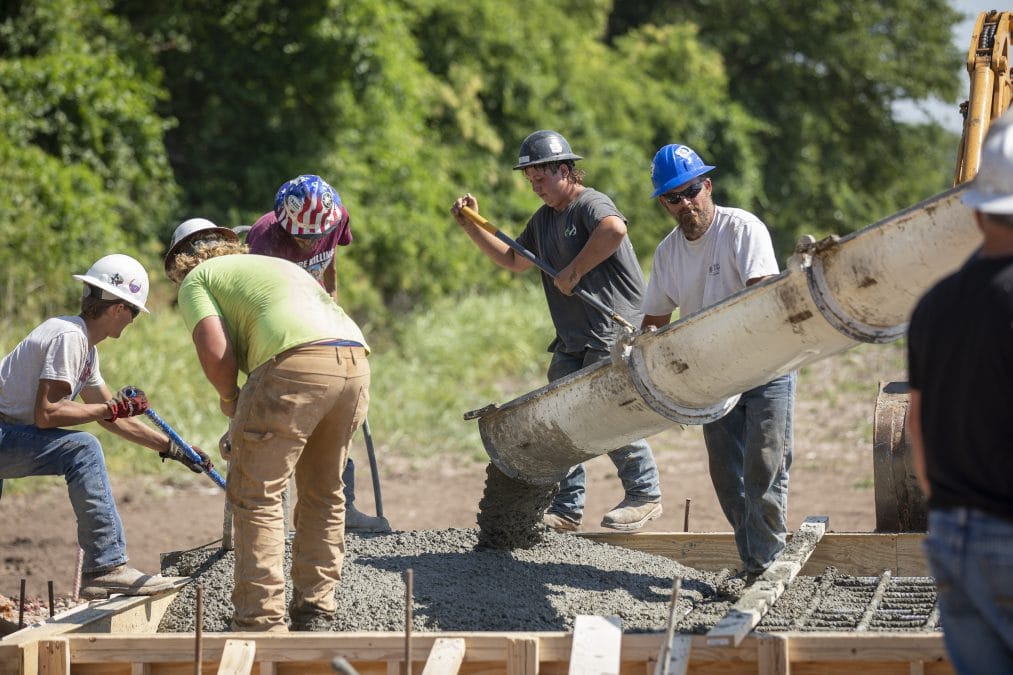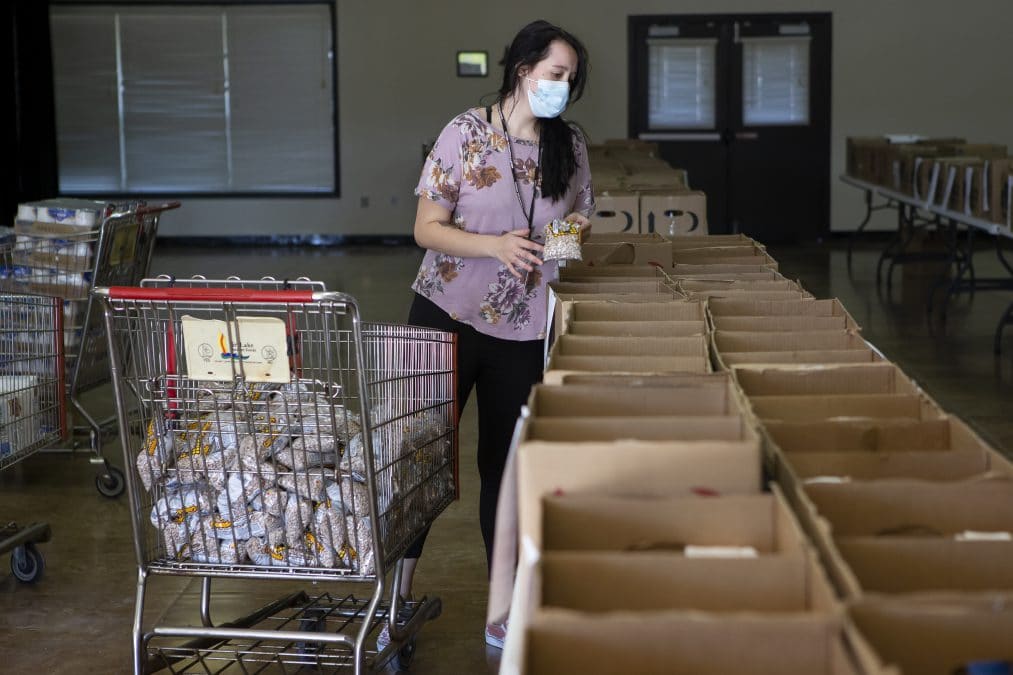This episode includes a look at new international business prospects with CPN, a story of Thanksgiving donations from employees, a visit to a Tribal member’s boot-making workshop and a recipe for traditional corn pancakes.
Iron Horse Industrial Park brings new international business opportunities

Citizen Potawatomi Nation is in the process of building and operating its own industrial park, giving business partners and tenants the unique opportunity to be in international business with a Native American sovereign nation. It recently opened an electrical substation able to power the entire park. CPN Director of Economic Development and Planning Jim Collard explained the park’s business potential.
“Manufacturing has a huge economic multiplier associated with it. So, it allows Tribal and non-Tribal members to get jobs that are higher paying than say retail or other industries, manufacturing being the highest. That’s the biggest thing. It diversifies the Tribal economy,” Collard said.
Learn more about Iron Horse Industrial Park at ironhorsecpn.com or email Jim Collard at jcollard@potawatomi.org.
Master bootmaker finds artistry in tradition

Citizen Potawatomi Nation tribal member Terry Don Peltier began his business Top Hand Boots located near Prague, Oklahoma, four years ago. He loves cowboy boots — a combination of versatility, strength and rugged beauty. The Peltier family descendant’s collection spans both his closet and the workshop in his barn.
“My enjoyment is whenever I get finished with a boot, and the customer comes in and they pop that boot on and the smile on their face when it fits them like a glove. That right there makes it all worthwhile,” Peltier said.
A pair of Top Hand Boots starts at $600 and takes Peltier approximately 40 hours to complete. He also requires a six-month work period, although he often completes them sooner. Find Top Hand Boots on Facebook @TopHandBoots.
Thanksgiving basket food drive reaches more families than ever in 2020

The coronavirus pandemic made everything look and feel different throughout the last year, including the holidays. However, employees of Citizen Potawatomi Nation’s Workforce Development & Social Services were still determined to provide as many delicious Thanksgiving meals as possible. The staff expanded the number of families they served with their annual Thanksgiving Food Basket Drive, from 185 to 225.
“For me, it was that; seeing the community come together and serve these people and see families so excited, some of them in tears, because they’re getting this. To get to be a part of that is a huge, huge deal,” said Homemaker Services, Safe & Stable Families Counselor Kym Coe.
For more information about CPN’s Workforce Development & Social Services programs, visit cpn.news/workforce.
Learning Language
It’s time for Learning Language, when the CPN Language Department joins us to teach vocabulary, songs, stories and more. Today, Language Aide Ragan Marsee teaches how to make four-ingredient corn pancakes or pegna in Potawatomi.
Recipe
Nétem (first), ndowabdan (search) for a yowen (tool) to grate mdamen (the corn) off the mdamnatek (cob) and into a bwaskyaknagen (deep bowl). I use a chis (cheese) grater for quick results. Add to the ngot (batter) bnénech (one handful) of napané (flour), a dash of dkabodgojgen (baking powder), and salt to your liking! Heat up a kadi (skillet) with a bmédé (oil) of your choice. Nmenbdan (I like the taste) of bmédéwésh (olive oil, literally ‘oil plant’), if you like savory. Dmagméshi bkan (coconut, literally ‘monkey nut’) and vegetable bmédé (oil) is better for wishkpokwét (sweet) recipes.
- Dkabodgojgen (dKaH-bOd-goJ-gIn) – Baking powder
- Mdamen (mDaH-mIn) – Corn
- Napané (naH-paH-neH) – Flour
- Bmedé (bMed-eH) –Oil
- Nétem (neH-tuHm) – First
- Pegna (pehG-naH) – Traditional flat corn pancake
- Nbegya (nBeh-GyaH) – Flat
- Mbénkik (mBan-kEEk) – Pancake
- Neyew (nEE-yOw) – Four
- Wishkpokwét (wEEshK-pOh-kwEhT) – Sweet
- Ndowabdan (nDoh-wahB-daHn) – Search
- Yowen (yoH-wIn) – Tool
- Mdamen (mDah-mIn) – Corn
- Mdamnatek (mDah-MN-ah-tehK) – Corn cob (literally “corn stick”)
- Bwaskyaknagen (BwaH-skee-yahK-naH-giN) – Deep bowl
- Chis (chEEs) – Cheese
- Ngot Bnénech (nGohT bNeh-neh-tCh) – One handful
- Kadi (kaH-dee) – Skillet
- Nmenbdan (nMen-bDahn) – I like the taste of something (The ‘N’ at the beginning of the word indicates its something I like; if I said “Gmendbdan” that would mean you like it.)
- Bmédéwésh (bMeh-Deh-weSh) – Olive Oil
- Dmagméshi Bkan (dMaG-meH-shee bKah-N) – Coconut
- Msézé Wiyas (mSeh-zeh Wee-yasss) – Turkey meat
- Wabgon (waB-gOn) – Pumpkin
- Wisnewen (wEEs-neH-wIn) – Food
- Kwésmen (kWeH-sMeN) – Squash
- Mbedé (mBed-eH) – Butter
- Mshimen Bitojishkwégen (mSHee-min Bee-toh-jeesh-kweh-gin) – Apple pie (“bitojishkwégen” literally translates to between layers, so it can also be used for a sandwich or lasagna.)
You can find a video for making pegna at cpn.news/pegna.
For more information and opportunities with language, including self-paced classes, visit cpn.news/language. You can find an online dictionary at potawatomidictonary.com as well as videos on YouTube. There are also Potawatomi courses on the language-learning app Memrise.
Hownikan Podcast is produced and distributed by Citizen Potawatomi Nation’s Public Information Department. Subscribe to Hownikan Podcast on Apple Podcasts, Spotify, SoundCloud and wherever you find your favorite shows. Find digital editions of the Tribal newspaper here.
